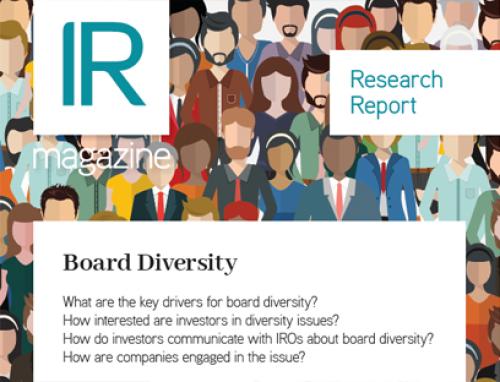More highlights from the IR Magazine Greater China Conference & Awards 2010
IR magazine was back in Hong Kong in December for the 10th Greater China Conference & Awards. This was the first year the Hong Kong and Taiwan conference and awards were integrated with the mainland China events. The combined event attracted more than 200 attendees from the region.
Conference sessions
IR response: crisis management and damage limitation
Lisa Cheong, Clear Media
‘The government made us remove two thirds of our bus shelters in preparation for the Shanghai Expo, which led to the issuance of a profit warning. The first crisis was in the fourth quarter of 2008 when the market expectation was 10 percent to 15 percent growth; until then our forecast was in line with market expectations. The most recent forecast got wider and we ended up 20 percent below market expectations. We were nervous so I called all our major shareholders in the US, and our share price was not too badly affected.’
Ashia Razzaq, head of investor relations, Standard Chartered
‘There is significant subjectivity when it comes to the sell side – valuations, industry trends, where we are in the macro cycle – but there is a lot you can control. The sell side remains a key channel to reach the buy side. Whether or not buy-siders read the reports, analysts are loud stakeholders. The link between the sell side and specialty equity sales should not be underestimated. Neutrality is important and focusing on those analysts who issue buy recommendations is problematic – it misses the point of cyclical markets completely.’
Best practice IR: Case study 1 – Measuring the value of your corporate IR program
Vincent Tse, China Resources Enterprise
‘When investors queried our asset swap transaction with our parent company, we actively organized analyst briefings, held meetings with the investment community to explain details of the transactions, performed roadshows with foreign investors, and discussed with media and commentators the rationale behind the transactions.’
Best practice IR: Case study 2 – IR and new media
Sydney Zhang, China Unicom
‘Stakeholders and investors are increasingly using research on social media to obtain information. In Hong Kong many of the journalists use Chinese micro-blogging sites to follow stories.’
Best practice IR: Case study and panel discussion
Stephen Chu, Prosperity REIT
‘Pick a sponsoring bank with a strong sales team. If it has strong sales and analytical cover, it supports you. Try a dry run with your finance, compliance and IR teams; get them to come up with the hardest questions imaginable.’
Bruce Salzer, director and head of corporate access, Standard Chartered
‘Non-deal roadshows are more suitable for large firms, while corporate days are better suited to smaller firms. It is also worth noting that brokers find it difficult to split cities: they are happy to share roadshows but keeping cities exclusive is preferable.’
IR Magazine Greater China Awards
Chinese heavyweights China Mobile and PetroChina won the most awards at the IR Magazine Greater China Awards, held at the Conrad Hotel in Hong Kong in December. China Mobile walked away with the grand prix for the best overall IR by a Hong Kong-listed company, best IR for a large-cap company and a sector award for technology, media and telecommunications (pan-China). It also won the pan-Asian award for best overall IR. It was the eighth time the company has won the grand prix since 2001.
PetroChina won the prestigious pan-Asian award for best IR professional (Mao Zefang), adding to wins for best overall IR by a Chinese state-owned enterprise, best IR professional (mainland China) and best IR by sector (energy & utilities). Li Hao of China Merchants bank won best IR by a CFO (pan-Asia).
Taiwan Semiconductor Manufacturing Company had the most nominations, being short-listed in nine categories. On the day it won best overall IR (Taiwan), best IR professional (Taiwan) for Elizabeth Sun and best IR by a CFO (Taiwan) for Lora Ho. The best IRO award marked Sun’s 10th consecutive win at these awards. As she collected the trophy, Sun observed: ‘The competition is getting tougher so this really means more than ever.’
The nominees and winners were determined by an independent survey of analysts and investors conducted by Thomson Extel. The events sponsors are listed below.
Breakfast roundtable: Greater China
Before the Greater China conference and awards, IR magazine hosted a roundtable in association with Ipreo, focusing on corporate governance and featuring controversial investor activist David Webb. He identified three main causes for concern in Hong Kong:
1. The general mandate and lack of preemptive rights. Webb thinks companies must offer all shareholders the chance to maintain their pro-rata stake when new shares are issued. The arrival of poll voting in 2009 has helped fire up the discussion, Webb said: ‘In the case of Gome, that is why shareholders voted down the general mandate.’
2. Quarterly financial reporting. ‘Opponents say it will make management more short-termist, but this is not true,’ Webb said. ‘It reduces uncertainty and investors will put a premium on your stock. And it needs to be more than a profit line and turnover line – this doesn’t tell investors enough about your company.’
3. Inter-company lending. This was flagged up as a concern by CFA Institute not long ago, and Webb says it’s getting worse. ‘There is a worrying trend of listed companies lending money to their parent firms,’ he explained. ‘These kinds of corporate structures should be merged into one conglomerate, which would permit them to move the money around within the group, allowing for a higher return on equity.’
On annual meetings
Hong Kong, like most markets, suffers from low annual meeting attendance. ‘AGMs are difficult for shareholders,’ Webb pointed out. ‘They are often held on weekdays so keen retail investors are rarely able to attend. At the same time, many institutions feel they can influence better behind closed doors.’
Webb also abhors directors’ lack of attendance. ‘Perhaps if more directors showed up, more investors would too,’ he said. ‘I always vote against a director who doesn’t attend his or her own company’s AGM.’
On CSR and philanthropy
‘Societies are responsible for the laws and regulations that govern corporate behaviour,’ Webb noted. ‘Societies can impose laws on carbon emissions but otherwise you can’t expect firms to put themselves at a disadvantage by voluntary reducing emissions if that makes them less competitive.
‘If I see a company funding a charity center in rural China, then unless I can see a connection between that donation and the bottom line, I will contest it. If a company is giving away shareholders’ money without expecting the donation to add shareholder value, the directors are breaching their fiduciary duties. Giving away money is something shareholders can do with their dividends.’![]()










